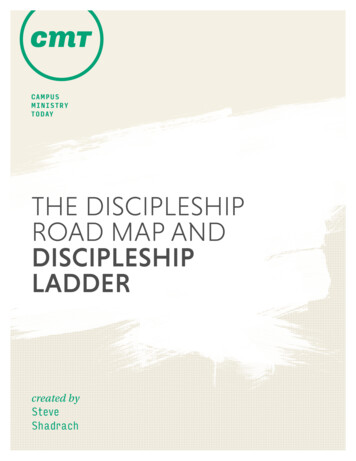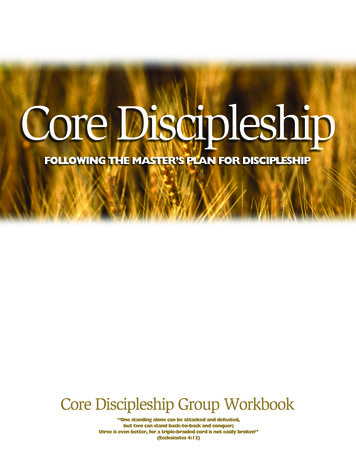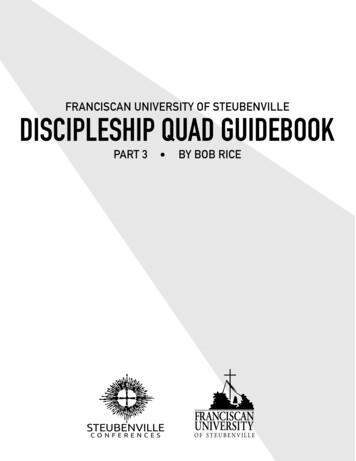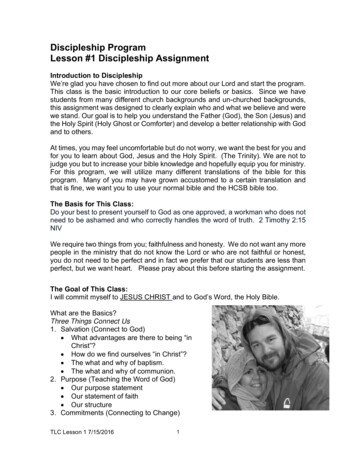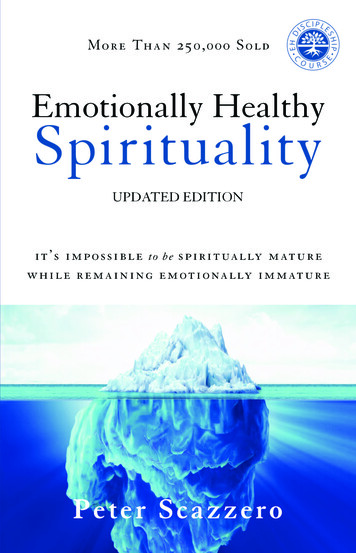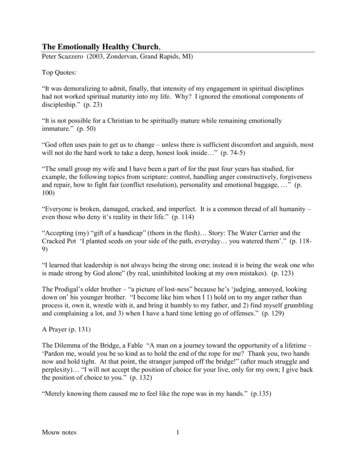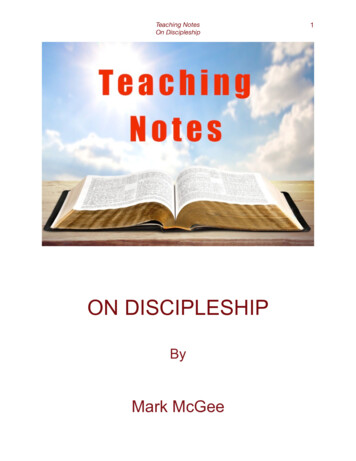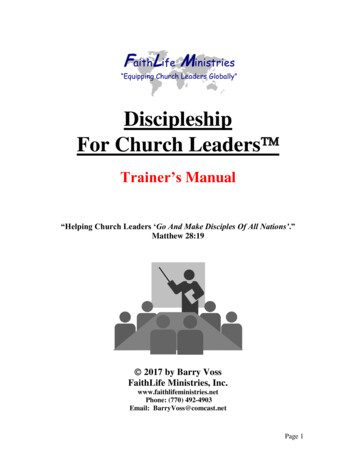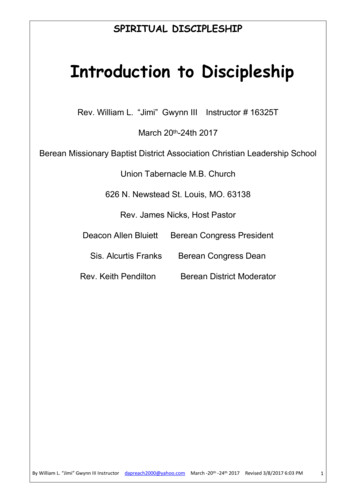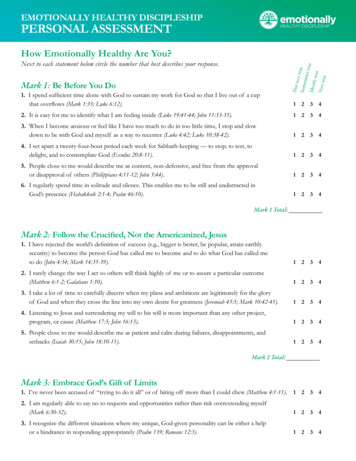
Transcription
EMOTIONALLY HEALTHY DISCIPLESHIPPERSONAL ASSESSMENTNext to each statement below circle the number that best describes your response.Mark 1: Be Before You Do1. I spend sufficient time alone with God to sustain my work for God so that I live out of a cupthat overflows (Mark 1:35; Luke 6:12).Not ver y trueSometimestrueMostly trueVer y tr ueHow Emotionally Healthy Are You?12342. It is easy for me to identify what I am feeling inside (Luke 19:41-44; John 11:33-35).12343. When I become anxious or feel like I have too much to do in too little time, I stop and slowdown to be with God and myself as a way to recenter (Luke 4:42; Luke 10:38-42).12344. I set apart a twenty-four-hour period each week for Sabbath-keeping — to stop, to rest, todelight, and to contemplate God (Exodus 20:8-11).12345. People close to me would describe me as content, non-defensive, and free from the approvalor disapproval of others (Philippians 4:11-12; John 5:44).12346. I regularly spend time in solitude and silence. This enables me to be still and undistracted inGod’s presence (Habakkuk 2:1-4; Psalm 46:10).1234Mark 1 Total:Mark 2: Follow the Crucified, Not the Americanized, Jesus1. I have rejected the world’s definition of success (e.g., bigger is better, be popular, attain earthlysecurity) to become the person God has called me to become and to do what God has called meto do (John 4:34; Mark 14:35-39).12342. I rarely change the way I act so others will think highly of me or to assure a particular outcome(Matthew 6:1-2; Galatians 1:10).12343. I take a lot of time to carefully discern when my plans and ambitions are legitimately for the gloryof God and when they cross the line into my own desire for greatness (Jeremiah 45:5; Mark 10:42-45).12344. Listening to Jesus and surrendering my will to his will is more important than any other project,program, or cause (Matthew 17:5; John 16:13).12345. People close to me would describe me as patient and calm during failures, disappointments, andsetbacks (Isaiah 30:15; John 18:10-11).1234Mark 2 Total:Mark 3: Embrace God’s Gift of Limits1. I’ve never been accused of “trying to do it all” or of biting off more than I could chew (Matthew 4:1-11).12342. I am regularly able to say no to requests and opportunities rather than risk overextending myself(Mark 6:30-32).12343. I recognize the different situations where my unique, God-given personality can be either a helpor a hindrance in responding appropriately (Psalm 139; Romans 12:3). 1 2 3 4
Not ver y trueSometimestrueMostly trueVer y tr ue4. It’s easy for me to distinguish the difference between when to help carry someone else’s burdenand when to let it go so they can carry their own burden (Galatians 6:2, 5). 1 2 3 45. I have a good sense of my emotional, relational, physical, and spiritual capacities, intentionallypulling back to rest and replenish (Mark 1:21-39).12346. Those close to me would say that I am good at balancing family, rest, work, and play in abiblical way (Exodus 20:8).1234Mark 3 Total:Mark 4: Discover the Hidden Treasures Buried in Grief and Loss1. I openly admit my losses and disappointments (Psalm 3, 5). 1 2 3 42. When I go through a disappointment or a loss, I reflect on how I’m feeling rather than pretendthat nothing is wrong (2 Samuel 1:4, 17-27; Psalm 51:1-17).12343. I take time to grieve my losses as David and Jesus did (Psalm 69; Matthew 26:39; John 11:35; 12:27).12344. People who are in great pain and sorrow tend to seek me out because it’s clear to them that I amin touch with the losses and sorrows in my own life (2 Corinthians 1:3-7). 1 2 3 45. I am able to cry and experience depression or sadness, explore the reasons behind it, and allowGod to work in me through it (Psalm 42; Matthew 26:36-46). 1 2 3 4Mark 4 Total:Mark 5: Make Love the Measure of Spiritual Maturity1. I am regularly able to enter into the experiences and feelings of other people, connecting deeplywith them and taking time to imagine what it feels like to live in their shoes (John 1:1-14;2 Corinthians 8:9; Philippians 2:3-5).12342. People close to me would describe me as a responsive listener (Proverbs 10:19; 29:11; James 1:19).12343. When I confront someone who has hurt or wronged me, I speak more in the first person (“I” and“me”) about how I am feeling rather than speak in blaming tones (“you” or “they”) about what wasdone (Proverbs 25:11; Ephesians 4:29-32).12344. I have little interest in making snap judgments about other people (Matthew 7:1-5). 1 2 3 45. People would describe me as someone who makes “loving well” my number one aim(John 13:34-35; 1 Corinthians 13).1234Mark 5 Total:Mark 6: Break the Power of the Past1. I resolve conflict in a clear, direct, and respectful way, avoiding unhealthy behaviors I may havelearned growing up in my family, such as painful putdowns, avoidance, escalating tensions, orgoing to a third party rather than to the person directly (Matthew 18:15-18). 1 2 3 42. I am intentional at working through the impact of significant “earthquake” events from the pastthat have shaped my present, such as the death of a family member, an unexpected pregnancy,divorce, addiction, or financial disaster (Genesis 50:20; Psalm 51). 1 2 3 4
Not ver y trueSometimestrueMostly trueVer y tr ue3. I am able to thank God for all my past experiences, seeing how he has used them to uniquely shapeme into who I am (Genesis 50:20; Romans 8:28-30).12344. I can see how certain “generational sins” have been passed down to me through my family history,including character flaws, lies, secrets, ways of coping with pain, and unhealthy tendencies in relatingto others (Exodus 20:5; cf. Genesis 20:2;26:7; 27:19; 37:1-33). 1 2 3 45. I don’t need approval from others to feel good about myself (Proverbs 29:25; Galatians 1:10). 1 2 3 46. I take responsibility and ownership for my past rather than blame others (John 5:5-7).1234Mark 6 Total:Mark 7: Lead out of Weakness and Vulnerability1. I often admit when I’m wrong, readily asking forgiveness from others (Matthew 5:23-24).12342. I am able to speak freely about my weaknesses, failures, and mistakes (2 Corinthians 12:7-12). 1 2 3 43. Others would readily describe me as approachable, gentle, open, and transparent(Galatians 5:22-23; 1 Corinthians 13:1-6).12344. Those close to me would say that I am not easily offended or hurt (Matthew 5:39-42; 1 Corinthians 13:5).12345. I am consistently open to hearing and applying constructive criticism and feedback that othersmight have for me (Proverbs 10:17; 17:10; 25:12).12346. I am rarely judgmental or critical of others (Matthew 7:1-5). 1 2 3 47. Others would say that I am slow to speak, quick to listen, and good at seeing things from theirperspective (James 1:19-20).1234Mark 6 Total:TALLY YOUR ASSESSMENT RESULTSFor each group of questions on the previous pages: Add your responses to get the total for that group. Transfer your totals to the the right column below. Plot your answers and connect the dots to create a graph on the next page, following the sample above the graph. Read the descriptions on the following pages to learn more about your level of emotional health in each area.What patterns do you discern?Marks of Emotionally Healthy DiscipleshipTotalsMark 1. Be Before You Do/ 24Mark 2. Follow the Crucified, Not the Americanized, Jesus/ 20Mark 3. Receive God’s Gift of Limits/ 24Mark 4. Discover the Treasures Buried in Grief and Loss/ 20Mark 5. Make Love the Measure of Spiritual Maturity/ 20Mark 6. Break the Power of the Past/ 24Mark 7. Lead out of Weakness and Vulnerability/ 28
SAMPLE2091013161421UNDERSTANDING YOUR ASSESSMENT:LEVELS OF EMOTIONAL MATURITYBeing an emotionally healthy disciple is not an all-or-nothing condition; it operates on a continuum that ranges frommild to severe, and may change from one season of life and ministry to the next. As you read through the descriptionsbelow, what stands out to you? Wherever you find yourself, the good news is that you can make progress and becomean increasingly more mature disciple. So even if your current state of discipleship is sobering, don’t be discouraged.You can learn and grow through failures and mistakes, and it is possible for anyone to make progress. Here are someobservations to help you better understand your assessment results.EMOTIONAL INFANTI look for other people to take care of me emotionally and spiritually. I often have difficulty in describing andexperiencing my feelings in healthy ways and rarely enter the emotional world of others. I am consistently driven bya need for instant gratification, often using others as objects to meet my needs. People sometimes perceive me asinconsiderate and insensitive. I am uncomfortable with silence or being alone. When trials, hardships, or difficultiescome, I want to quit God and the Christian life. I sometimes experience God at church and when I am with otherChristians, but rarely when I am at work or home.
EMOTIONAL CHILDWhen life is going my way, I am content. However, as soon as disappointment or stress enter the picture, I quickly unravelinside. I often take things personally, interpreting disagreements or criticism as a personal offense. When I don’t get myway, I often complain, withdraw, manipulate, drag my feet, become sarcastic, or take revenge. I often end up living off thespirituality of other people because I am so overloaded and distracted. My prayer life is primarily talking to God, tellinghim what to do and how to fix my problems. Prayer is more a duty than a delight.EMOTIONAL ADOLESCENTI don’t like it when others question me. I often make quick judgments and interpretations of people’s behavior. Iwithhold forgiveness from those who sin against me, avoiding or cutting them off when they do something to hurtme. I subconsciously keep records on the love I give out. I have trouble really listening to another person’s pain,disappointments, or needs without becoming preoccupied with myself. I sometimes find myself too busy to spendadequate time nourishing my spiritual life. I attend church and serve others but enjoy few delights in Christ. MyChristian life is still primarily about doing, not being with him. Prayer continues to be mostly me talking with littlesilence, solitude, or listening to God.EMOTIONAL ADULTI respect and love others without having to change them or becoming judgmental. I value people for who they are,not for what they can give me or how they behave. I take responsibility for my own thoughts, feelings, goals, andactions. I can state my own beliefs and values to those who disagree with me—without becoming adversarial. I amable to accurately self-assess my limits, strengths, and weaknesses. I am deeply convinced that I am absolutely loved byChrist and do not look to others to tell me I’m okay. I am able to integrate doing for God and being with him (Mary andMartha). My Christian life has moved beyond simply serving Christ to loving him and enjoying communion with him.Permission is granted for any purchaser of this book to make copies of this inventory as long as it is not changed or sold for a profit, and this creditis included. Taken from Peter Scazzero, Emotionally Healthy Discipleship, Zondervan 2021. For more information and further resources, contactemotionallyhealthy.org.
I look for other people to take care of me emotionally and spiritually. I often have difficulty in describing and experiencing my feelings in healthy ways and rarely enter the emotional world of others. I am consistently driven by a need for instant gratification, often using others as objects to meet my needs. People sometimes perceive me as
